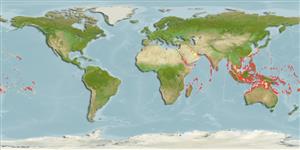Common names from other countries
Environment: milieu / climate zone / depth range / distribution range
Ökologie
seewasser riff-verbunden; standorttreu (Ref. 51243); tiefenbereich 5 - 110 m (Ref. 128797). Tropical; 32°N - 24°S, 30°E - 137°W
Indo-Pacific: Red Sea, East Africa eastward through northern Australia to Line, Marquesas and Society Islands, north to southern Japan
Size / Gewicht / Alter
Maturity: Lm ? range ? - ? cm
Max length : 50.0 cm TL Männchen/unbestimmt; (Ref. 4420); common length : 30.0 cm TL Männchen/unbestimmt; (Ref. 3109)
Rückenflossenstacheln (insgesamt): 3; Rückenflossenweichstrahlen (insgesamt): 33-36; Afterflossenstacheln 0; Afterflossenweichstrahlen: 28 - 31.
Inhabits reef channels or along slopes that are subject to strong currents (Ref. 48637). Occur in current-swept seaward coral reefs. Usually form aggregations and feed on zooplankton as well as sponges (Ref. 9770). Juveniles associated with isolated patches of rubble or crevices with proper-sized shelter holes (Ref. 1602). Oviparous (Ref. 205). Form large schools to feed on zooplankton (Ref. 48637). Also taken by drive-in nets (Ref. 9770). Marketed fresh or dried-salted. Minimum depth reported taken from Ref. 30874. Popular aquarium fish (Ref. 37816).
Life cycle and mating behavior
Geschlechtsreife | Fortpflanzung | Ablaichen | Eier | Fecundity | Larven
Distinct pairing (Ref. 205). Only females tend the eggs but both parents keep guard (Ref. 116451).
Randall, J.E., G.R. Allen and R.C. Steene, 1990. Fishes of the Great Barrier Reef and Coral Sea. University of Hawaii Press, Honolulu, Hawaii. 506 p. (Ref. 2334)
IUCN Rote Liste Status (Ref. 130435)
CITES (Ref. 128078)
Not Evaluated
Bedrohung für Menschen
Harmless
Nutzung durch Menschen
Fischereien: weniger kommerziell; Aquarium: Kommerziell
Tools
Zusatzinformationen
Download XML
Internet Quellen
Estimates based on models
Preferred temperature (Ref.
115969): 24.9 - 29.1, mean 27.9 (based on 918 cells).
Phylogenetic diversity index (Ref.
82804): PD
50 = 1.0000 [Uniqueness, from 0.5 = low to 2.0 = high].
Bayesian length-weight: a=0.03236 (0.01900 - 0.05512), b=2.96 (2.81 - 3.11), in cm Total Length, based on LWR estimates for this species & (Sub)family-body (Ref.
93245).
Trophic level (Ref.
69278): 3.4 ±0.41 se; based on food items.
Widerstandsfähigkeit (Ref.
120179): mittel, Verdopplung der Population dauert 1,4 - 4,4 Jahre. (Preliminary K or Fecundity.).
Fishing Vulnerability (Ref.
59153): Moderate vulnerability (40 of 100).
